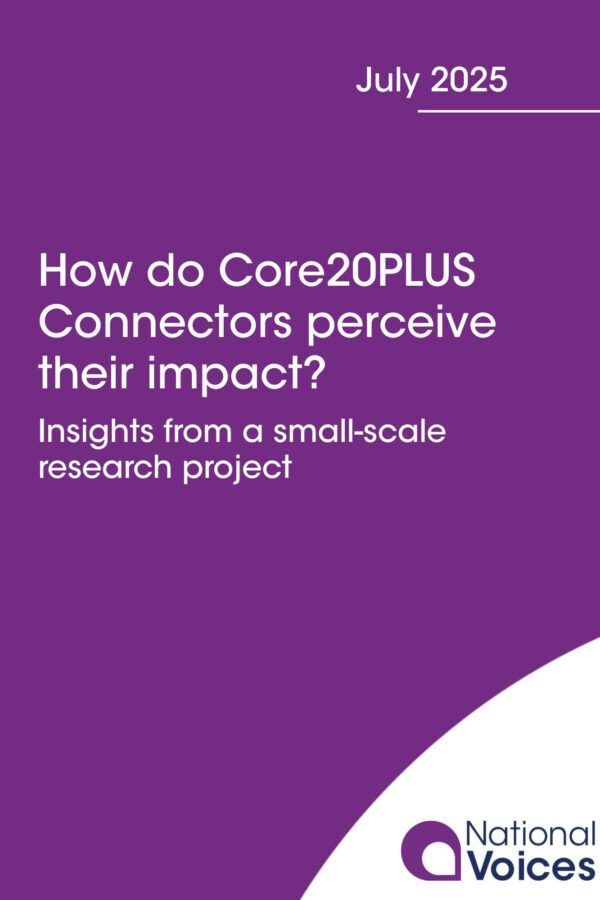
How do Core20PLUS Connectors perceive their impact? Insights from a small-scale research project
- The Core20PLUS5 Community Connector Programme
- Health inequalities
- Person-centred care
In Winter 2024 and Spring 2025 National Voices were commissioned to do this research by NHS South, Central and West (NHS SCW) Commissioning Support Unit during their final year of leading the delivery of the Core20PLUS Connectors programme on behalf of the Health Inequalities Improvement team at NHS England.
The Core20PLUS Connectors programme was part of the support framework for progressing the goals of Core20PLUS5. The programme, funded by NHS England, funded Integrated Care Systems (ICSs) to recruit, mobilise and support influential members of local communities – Connectors – to take practical action to improve health and reduce inequalities across the clinical priorities outlined in the Core20PLUS5 approach for adults and children and young people.
Through interviews with Connectors and VCSE coordinators, National Voices was tasked with:
- Uncovering any changes to the way local communities discuss and approach their health; and the way NHS services are delivered as a result of Connector activity.
- Understanding the stories and data that Connectors believe best communicate the impact of the programme.
- Exploring how these insights can inform any future iterations of the programme.
We found that Connectors unanimously agreed that their biggest impact is creating and holding spaces in which the local community can talk about health issues and/or access support and information without fear of judgement or discrimination. This was mostly enabled by Connectors having lived experience of a condition and/or belonging to the communities the programme is designed to engage with. Whilst Connectors discussed some quantitative metrics used to track the outputs and impact of their work, it was anecdotal evidence in the form of personal stories that motivated and encouraged Connectors the most.
Connectors also shared barriers they encountered in delivering their role. One of the biggest barriers they faced was insufficient funding in terms of both amount and duration, making it harder to pay for key items such as venues and making it more difficult to build long-term relationships with local communities due to high levels of Connector turnover. Connectors also explained that when the communities that they work with are not aware of the programme or its objectives they are required to spend a lot of time explaining their role and what it is they are trying to achieve. This barrier can be exacerbated by the lack of available funding for marketing; and if there are several seemingly similar initiatives already in place locally.
With the potential national roll-out of the Community Health and Wellbeing Workers, here are some of the key learnings from the Core20PLUS Connectors model:
- The size and duration of funding available can have a major impact on the ability to develop trust and relationships.
- While some individuals may be open to undertake Connector roles as volunteers, for many people, receiving payment for their work and in recognition of the value they add to health and care is critical.
- People in Connector and VCSE Coordinator roles are often interested in funders putting in place infrastructure to share best practice and learning at a national scale.
- People in Connector and VCSE Coordinator roles are interested in understanding mechanisms through which national policy is shaped by the insights they gather; and are keen for feedback loops to be in place to play back the impact of insights they gather back to them.
To find out more about this project please get in touch with Louis Horsley, Research and Insight Manager at National Voices: louis.horsley@nationalvoices.org.uk